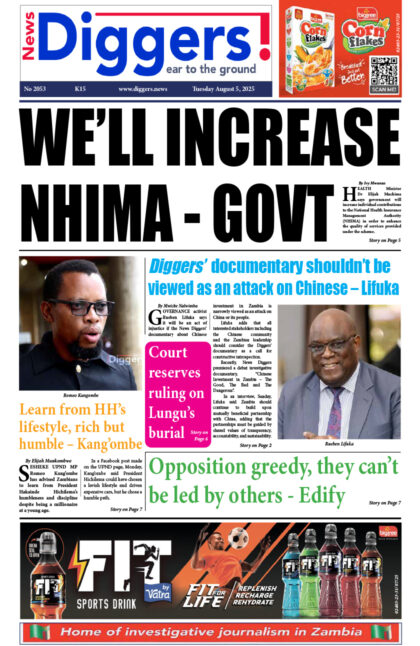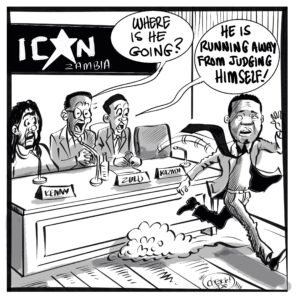President Edgar Lungu’s spokesperson Amos Chanda has confirmed that the Head of State signed a US$500 million sovereign guarantee for a Zesco loan, as revealed last week, in place of the Minister of Finance.
And Chanda told News Diggers! in an exclusive interview that all the loans that were signed by former finance minister Alexander Chikwanda after Parliament was dissolved in 2016 are being treated as illegal by lenders and they have been brought back for re-signing.
Last week, News Diggers! reported that President Lungu signed a sovereign guarantee for a South African company called STAG Africa to raise US$500 million on behalf of Zesco, when the utility only needed US$350 million.
An Africa Confidential report also reported that the deal meant that Zesco would acquire and service a US$500 million loan, but only US$350 would be transferred to the utility.
In this verbatim, Chanda explains that the President had not yet appointed a Minister of Fianance at the time when Zesco needed emergency financing and he used his Presidential powers to sign the loan; denying that the utility needed less than what was solicited.
Question: I am calling in connection with this latest Africa Confidential report which is alleging that the President personally signed a sovereign guarantee for STAG Africa to raise US$500 million for it’s projects. They are saying that this is not normal procedure. And our own investigations show that indeed the President did this while inquiries indicate that it is illegal for the President to personally sign a sovereign guarantee in place of the Minister of Finance. Are you able to help us understand why he did this?
Answer: Yes he signed the sovereign guarantee because at that time he was the Minister of Finance.
Q: When was the President Minister of Finance?
A: He was the Minister of Finance at the time he signed the sovereign guarantee. Cabinet had been dissolved, and he was the only minister in government at that time. I remember he was making Cabinet; so there was no Minister of Finance, he was the only one.
Q: was this in 2015 or 2016?
A: That was 2016, August 2016.
Q: But I recall that Cabinet was not dissolved and the ministers remained in office in August. So was this after or before elections?
A: This was signed after the elections, but the negotiations finished on 8th August. We had known then that the following day on 9th August, the ConCourt was going to nullify the stay of ministers in office, we had known that that was going to be the decision. I remember this was actually when he was making Cabinet, we were at Nyamvu lodge. The conclusion between Zesco finished on the 8th but the signature must have taken place between 16th and 23rd August. So after the elections, it was very certain that there was no Cabinet.
But even when Cabinet was there on appeal, the lawyers for STAG said that ‘none of those ministers’ signatures is going to be acceptable because they were in office on an appeal’. Just like most of the loans signed by [former finance minister Alexander] Chikwanda during that period when they were in office by court order, they have been re-signed by [Felix] Mutati, the Chinese brought them back. All the loans which he signed when he was minister by virtue of a court order, all those papers were brought back. The China Exim Bank brought back all of them because the Chinese Insurance company that insures those loans raised a concern and brought them back.
The few that escaped including the famous Digital Migration loan, do you know who has signed it?
Q: No I don’t.
A: It’s Margaret. It was brought back as late as last month because the signature then was Chikwanda’s. They were uncertain about the legality or authenticity of a minister whose authority was queried.
Q: Are you on record with that fact? Can I publish that loans are being brought back for re-signing because the lenders are uncomfortable with the authority of people who signed?
A: Yes, no loan that was signed by a minister who was questioned then, was ever honoured, they are still bringing them back. That, I am on record.
Q: But from our findings, we have established that Zesco had been looking for US$350 million, but the President signed a sovereign guarantee for STAG Africa at US$500 million, why is that?
A: No, Zesco was looking for US$500 million, but now they are looking for US$350 million, because since that time, they found some money. So now they are looking for US$350 million as I speak to you. They were looking for 500 and the sovereign guarantee for 500 was done. And that sovereign guarantee has in fact elapsed. Honourable [Felix] Mutati recommended that it be invalidated. Honourable [Margaret] Mwanakatwe has taken appropriate measures and invalidated it because they just didn’t want market volatility. I don’t know the exact stage at which it is, but the two ministers of finance invalidated that. It is not even worth the paper it is written on, it is out of time. So if Africa Confidential has joined yellow papers, that is extremely regrettable. Have they published it?
Q: They have published it and we have the report.
A: Oh my God. They did not even ask us; if they did, they were going to get the answer I have given you straight away that yes the President signed and he was Minister of Finance at the time. And I can tell you that your local sources are dead wrong. Ministers operated under delegated responsibility of the President. It would be awkward actually if the President was to sign a sovereign guarantee personally when the Minister of Finance is in post, but I can remember very well that he signed when he was Minister of Finance.
Q: And was there any criteria in picking the financial intermediary STAG Africa, because our sources have told us that the President was advised against this company on grounds that it was connected to some criminal elements?
A: Zesco complied with everything. By the time the President was being advised to sign that, he had been satisfied that all the procedures had been followed. And the sovereign guarantee he signed on the strength of… if it was a company like… in this case, they were just helping Zesco. Ministry of Energy, Ministry of Finance, all these officials would have gone through, especially that the President was to sign that. The due delegence that was taken on this one was higher than other sovereign guarantees which the Minister of Finance signs.
When it went into the market, it was one of the most attractive guarantees because it was sovereign in the real sense, because the sovereign himself signed. The terminology ‘sovereign’ emanates from a country guarantying at the highest level; now in this case, Zambia One himself represented the sovereignty of that guarantee. So when it went into the market, there was quite some excitement.
Q: But why did it fail to go through then if there was that excitement among the lenders?
A: We are very disappointed that it did not go through. I can tell you that the market players told us that the Zesco balance sheet was very bad. Even though the government was guarantying, they felt that the balance sheet for Zesco was unattractive, and these people wanted to deal with a productive sector which is Zesco and not government, they wanted to rely more on Zesco. They thought that a private sector entity would repay faster because the guarantee was just [that] ‘in case they fail, we will rely on government; but if government itself was indebted, we would have problems. So we would rather rely on Zesco itself’. So when they finally examined the balance sheet, according to Zesco, the balance sheet was extremely poor and then IDC was just trying to see how they could consolidate the debt. Government was also owing Zesco.
Most importantly, there was no clarity on who was going to pay for the very expensive emergency power that Zesco was importing. So the lenders at that time thought that Zesco was going to be in financial stress. That’s how come it didn’t go though. Otherwise, steps have been taken to cancel it. I cannot tell you [with] 100 per cent [certainty] whether the cancellation has occurred, but I can confirm that the sovereign guarantee is no longer active. If it hasn’t been cancelled, it’s means the process is still on going.
Q: Are you aware if there is another plan for Zesco on that US$350 million they were looking for, considering that the President’s sovereign guarantee did not yield anything?
A: Zesco is still in the market, almost reaching a deal of US$350 million with a British bank, because between then and now, they must have managed to find US$150 million from different sources. So the amount of pressure on them has reduced. The amount of money they need has reduced because they are now exporting to Zimbabwe, Congo and the water levels have improved.
Q: Was there an emergency that prompted the President to sign this sovereign guarantee? Why didn’t he wait to appoint a minister first.
A: The economic report stated that ‘Zambia’s industrial base in 90 days will be cut by 53 per cent’. So the President couldn’t wait because when the speculators saw that the country was on its knees and they said they could make that money available in two weeks. So a minister had to be found and at that time the Minister of Finance was the President.
At that time, that urgency was partially to finance the emergency power that we were getting from Mozambique. The compelling reasons was the emergency power. STAG was not going to be the ones to provide the money, they were asking other people. So that is the truth about this matter. And as I keep saying, the danger of lying over such a matter does not even lie on the head of President Lungu, it falls squarely on my head.
Q: And Mr Chanda, there seems to be very interesting links to this financial intermediary called STAG Africa. Local businessman and lawyer, Mr Lewis Mosho is connected to this company and he has a strong link to State House. What role and why is there this very strong link of Mr Mosho, STAG Africa and State House?
A: Is Mr Mosho a member of STAG Africa?
Q: As a matter of fact, we have correspondence indicating that Mr Mosho is actually the local partner of STAG Africa.
A: No, the sovereign guarantee was assigned to STAG Africa based in Cape Town. If there is that link or coincidence, first of all if he is linked to that, he is not a blacklisted lawyer. It is coincidental if that link is there, I think the sovereign guarantee was assigned to STAG Africa and if he is involved, well it is a coincidence. But if that coincidence is there, we are totally unaware as to whether he is precluded from acting as a financial intermediary or acting as a lawyer for any company. From what we know, he has not been debarred by Law Association of Zambia, I think he is a lawyer in good standing in that respect that he has a practicing certificate. He is a businessman who is not debarred, he is a stock market expert, that is what we know. But that sovereign guarantee was not signed with him in mind, we knew of STAG Africa.
Q: Thank you very much Mr Chanda.
A: You are welcome.























